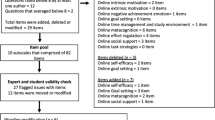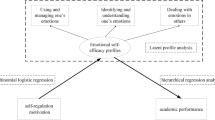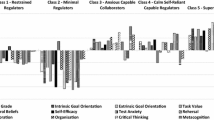Abstract
This study employed a social-cognitive view of self-regulated learning to examine how several personal factors relate to academic success in an online course. Service academy undergraduates (N = 481) completed a survey that assessed their motivational beliefs (self-efficacy and task value); negative achievement emotions (boredom and frustration); and several outcomes that included their use of self-regulated learning strategies (elaboration and metacognition), course satisfaction, and continuing motivation to enroll in future online courses. Results from several multiple regressions revealed that task value beliefs were the strongest and most consistent positive predictors of elaboration, metacognition, satisfaction, and continuing motivation; whereas self-efficacy beliefs were moderately strong positive predictors of satisfaction and continuing motivation only. On the other hand, students’ boredom and frustration were statistically significant predictors of metacognition, with boredom emerging as a negative predictor and frustration unexpectedly emerging as a positive predictor. Furthermore, both boredom and frustration were negatively related to satisfaction and continuing motivation. Taken together, results from this study provide some insight into the complex relations between students’ thoughts, feelings, and actions in an online course. Theoretical and empirical implications are discussed, as are study limitations and future directions.

Similar content being viewed by others
References
Abrami, P. C., & Bernard, R. M. (2006). Research on distance education: In defense of field experiments. Distance Education, 24, 5–26.
Alexander, P., Graham, S., & Harris, K. (1998). A perspective on strategy research: Progress and prospects. Educational Psychology Review, 10, 129–154.
Arbuckle, J. L. (2006). Amos 7.0 user’s guide. Chicago, IL: SPSS, Inc.
Artino, A. R. (2007). Online military training: Using a social cognitive view of motivation and self-regulation to understand students’ satisfaction, perceived learning, and choice. Quarterly Review of Distance Education, 8, 191–202.
Artino, A. R. (2008). Motivational beliefs and perceptions of instructional quality: Predicting satisfaction with online training. Journal of Computer Assisted Learning, 24, 260–270.
Artino, A. R., & McCoach, D. B. (2008). Development and initial validation of the online learning value and efficacy scale. Journal of Educational Computing Research, 38, 279–303.
Artino, A. R., & Stephens, J. M. (2006). Learning online: Motivated to self-regulation? Academic Exchange Quarterly, 10(4), 176–182.
Azevedo, R. (2005). Using hypermedia as a metacognitive tool for enhancing student learning? The role of self-regulated learning. Educational Psychologist, 40, 199–209.
Bandura, A. (1997). Self-efficacy: The exercise of control. New York: W. H. Freeman and Company.
Bandura, A. (2006). Guide for constructing self-efficacy scales. In F. Pajares & T. Urdan (Eds.), Adolescence and education, Vol. 4: Self-efficacy beliefs of adolescents (pp. 307–337). Greenwich, CT: Information Age Publishing.
Bandura, A., & Schunk, D. H. (1981). Cultivating competence, self-efficacy, and intrinsic interest through proximal self-motivation. Journal of Personality and Social Psychology, 41, 586–598.
Bernard, R. M., Abrami, P. C., Lou, Y., Borokhovski, E., Wade, A., Wozney, L., et al. (2004). How does distance education compare with classroom instruction? A meta-analysis of the empirical literature. Review of Educational Research, 74, 379–439.
Boekaerts, M., & Cascallar, E. (2006). How far have we moved toward the integration of theory and practice in self-regulation? Educational Psychology Review, 18, 199–210.
Chiu, C., Sun, S., Sun, P., & Ju, T. L. (2007). An empirical analysis of the antecedents of web-based learning continuance. Computers & Education, 49, 1224–1245.
Chyung, S. Y. (2001). Systematic and systemic approaches to reducing attrition rates in online higher education. The American Journal of Distance Education, 15(3), 36–49.
Cohen, J. (1988). Statistical power analysis for the behavioral sciences (2nd ed.). Hillsdale, NJ: Lawrence Erlbaum Associates.
Dabbagh, N., & Kitsantas, A. (2004). Supporting self-regulation in student-centered web-based learning environments. International Journal on E-Learning, 3(1), 40–47.
Eccles, J., & Wigfield, A. (1995). In the mind of the actor: The structure of adolescents’ achievement task values and expectancy-related beliefs. Personality and Social Psychology Bulletin, 21, 215–225.
Eccles, J. S., & Wigfield, A. (2002). Motivational beliefs, values, and goals. Annual Review of Psychology, 53, 109–132.
Flavell, J. (1979). Metacognition and cognitive monitoring: A new area of cognitive-developmental inquiry. American Psychologist, 34, 906–911.
Gable, R. K., & Wolfe, M. B. (1993). Instrument development in the affective domain: Measuring attitudes and values in corporate and school settings. Boston: Kluwer Academic Publishers.
Goetz, T., Pekrun, R., Hall, N., & Haag, L. (2006). Academic emotions from a social-cognitive perspective: Antecedents and domain specificity of students’ affect in the context of Latin instruction. British Journal of Educational Psychology, 76, 289–308.
Gunawardena, C. N., & McIsaac, M. S. (2004). Distance education. In D. H. Jonassen (Ed.), Handbook of research for educational communications and technology (2nd ed., pp. 355–396). Mahwah, NJ: Erlbaum.
Hadwin, A. F., Nesbit, J. C., Jamieson-Noel, D., Code, J., & Winne, P. H. (2007). Examining trace data to explore self-regulated learning. Metacognition and Learning, 2, 107–124.
Hamilton, R. J. (1997). Effects of three types of elaboration on learning concepts from text. Contemporary Educational Psychology, 22, 299–318.
Hartley, K., & Bendixen, L. D. (2001). Educational research in the Internet age: Examining the role of individual characteristics. Educational Researcher, 30(9), 22–26.
Hsu, J. T. (1997). Value, expectancy, metacognition, resourced management, and academic achievement: A structural model of self-regulated learning in a distance education context. Dissertation Abstracts International, 59(5), 1458. (UMI No. 9835152).
Hu, L., & Bentler, P. M. (1999). Cutoff criteria for fit indexes in covariance structure analysis: Conventional criteria versus new alternatives. Structural Equation Modeling, 6, 1–55.
Joo, Y., Bong, M., & Choi, H. (2000). Self-efficacy for self-regulated learning, academic self-efficacy, and Internet self-efficacy in Web-based instruction. Educational Technology Research and Development, 48(2), 5–17.
Judd, C. M., & Kenny, D. A. (1981). Estimating the effects of social interventions. Cambridge: Cambridge University Press.
Kinzie, M. B., & Sullivan, H. J. (1989). Continuing motivation, learner control, and CAI. Educational Technology Research and Development, 37(2), 5–14.
Klein, J. D., Erchul, J. A., & Pridemore, D. R. (1994). Effects of individual versus cooperative learning and type of reward on performance and continuing motivation. Contemporary Educational Psychology, 19, 23–32.
Kline, R. B. (2005). Principles and practice of structural equation modeling (2nd ed.). New York: The Guilford Press.
Lane, A. M., Whyte, G. P., Terry, P. C., & Nevill, A. M. (2005). Mood, self-set goals and examination performance: The moderating effect of depressed mood. Personality and Individual Differences, 39, 143–153.
Larreamendy-Joerns, J., & Leinhardt, G. (2006). Going the distance with online education. Review of Educational Research, 76, 567–605.
Lee, C. (2002). The impact of self-efficacy and task value on satisfaction and performance in a web-based course. Dissertation Abstracts International, 63(05), 1798. (UMI No. 3054599).
Lent, R. W., Brown, S. D., & Larking, K. C. (1984). Relation of self-efficacy expectations to academic achievement and persistence. Journal of Counseling Psychology, 31, 356–362.
Linnenbrink, E. A., & Pintrich, P. R. (2002). Achievement goal theory and affect: An asymmetrical bidirectional model. Educational Psychologist, 37, 69–78.
Linnenbrink, E. A., & Pintrich, P. R. (2004). Role of affect in cognitive processing in academic contexts. In D. Y. Dai & R. J. Sternberg (Eds.), Motivation, emotion, and cognition: Integrative perspectives on intellectual functioning and development (pp. 57–87). Mahwah, NJ: Lawrence Erlbaum Associates.
Lynch, R., & Dembo, M. (2004). The relationship between self-regulation and online learning in a blended learning context. International Review of Research in Open and Distance Learning, 5(2), 1–16.
Ma, X. (1999). A meta-analysis of the relationship between anxiety toward mathematics and achievement in mathematics. Journal for Research in Mathematics Education, 30, 520–540.
Maehr, M. (1976). Continuing motivation: An analysis of a seldom considered educational outcome. Review of Educational Research, 46, 443–462.
Miltiadou, M., & Savenye, W. C. (2003). Applying social cognitive constructs of motivation to enhance student success in online distance education. Association for the Advancement of Computing in Education Journal, 11(1), 78–95.
Pajares, F. (1996). Self-efficacy beliefs in academic settings. Review of Educational Research, 66, 543–578.
Pekrun, R. (2006). The control-value theory of achievement emotions: Assumptions, corollaries, and implications for educational research and practice. Educational Psychology Review, 18, 315–341.
Pekrun, R., Goetz, T., & Perry, R. P. (2005). Achievement emotions questionnaire (AEQ): User’s manual. Munich, Germany: University of Munich, Department of Psychology.
Pekrun, R., Goetz, T., Titz, W., & Perry, R. P. (2002). Academic emotions in students’ self-regulated learning and achievement: A program of qualitative and quantitative research. Educational Psychologist, 37, 99–105.
Pekrun, R., Hall, N. C., & Perry, R. P. (2008). Boredom in academic settings: Control-value antecedents and performance consequences of a neglected emotion. Paper presented at the annual meeting of the American Educational Research Association, New York, NY.
Persons, D. (2004). Navy e-Learning migrates to Navy Knowledge Online. Retrieved April 20, 2009, from http://www.news.navy.mil/search/display.asp?story_id=15816.
Pintrich, P. R. (1999). The role of motivation in promoting and sustaining self-regulated learning. International Journal of Educational Research, 31, 459–470.
Pintrich, P. R., & De Groot, E. V. (1990). Motivational and self-regulated learning component of classroom academic performance. Journal of Educational Psychology, 82, 33–40.
Pintrich, P. R., Smith, D. A. F., Garcia, T., & McKeachie, W. J. (1993). Reliability and predictive validity of the motivated strategies for learning questionnaire (MSLQ). Educational and Psychological Measurement, 53, 801–813.
Robbins, S. B., Lauver, K., Le, H., Davis, D., Langley, R., & Carlstrom, K. (2004). Do psychosocial and study skill factors predict college outcomes? A meta-analysis. Psychological Bulletin, 130, 261–288.
Roca, J. C., Chiu, C., & Martinez, F. J. (2006). Understanding e-learning continuance intention: An extension of the technology acceptance model. Human-Computer Studies, 64, 683–696.
Salomon, G. (1984). Television is “easy” and print is “tough”: The differential investment of mental effort in learning as a function of perceptions and attributions. Journal of Educational Psychology, 76, 647–658.
Schunk, D. H. (2005). Self-regulated learning: The educational legacy of Paul R. Pintrich. Educational Psychologist, 40, 85–94.
Schunk, D. H., Pintrich, P. R., & Meece, J. L. (2008). Motivation in education: Theory, research, and applications (3rd ed.). Upper Saddle River, NJ: Pearson Education.
Schunk, D. H., & Zimmerman, B. J. (Eds.). (2008). Motivation and self-regulated learning: Theory, research, and applications. New York: Lawrence Erlbaum Associates.
Shadish, W. R., Cook, T. D., & Campbell, D. T. (2002). Experimental and quasi-experimental designs for generalized causal inference. Boston: Houghton-Mifflin.
Tallent-Runnels, M. K., Thomas, J. A., Lan, W. Y., Cooper, S., Ahern, T. C., Shaw, S. M., et al. (2006). Teaching courses online: A review of the research. Review of Educational Research, 76, 93–135.
Thorndike, R. M. (2005). Measurement and evaluation in psychology and education (7th ed.). Upper Saddle River, NJ: Pearson Education, Inc.
United States Naval Academy (2007). Class of 2011 profile [Fact sheet]. Retrieved January 18, 2008, from http://www.usna.edu/Admissions/documents/Classof2011Profile.pdf.
Wang, M. C., Haertel, G. D., & Walberg, H. J. (1990). What influences learning? A content analysis of review literature. Journal of Educational Research, 84, 30–43.
Wang, A. Y., & Newlin, M. H. (2002). Predictors of web-student performance: The role of self-efficacy and reasons for taking an on-line class. Computers in Human Behavior, 18, 151–163.
Whipp, J. L., & Chiarelli, S. (2004). Self-regulation in a web-based course: A case study. Educational Technology Research and Development, 52(4), 5–22.
Wood, R. E., & Bandura, A. (1989). Social cognitive theory of organizational management. Academy of Management Review, 14, 361–384.
Wosnitza, M., & Volet, S. (2005). Origin, direction and impact of emotions in social online learning. Learning and Instruction, 15, 449–464.
Zembylas, M., Theodorou, M., & Pavlakis, A. (2008). The role of emotions in the experience of online learning: Challenges and opportunities. Educational Media International, 45, 107–117.
Zhao, Y., Lei, J., Yan, B., Lai, C., & Tan, H. S. (2005). What makes the difference? A practical analysis of research on the effectiveness of distance education. Teachers College Record, 107, 1836–1884.
Zimmerman, B. J. (2000a). Attaining self-regulation: A social cognitive perspective. In M. Boekaerts, P. R. Pintrich, & M. Zeidner (Eds.), Handbook of self-regulation (pp. 13–39). San Diego, CA: Academic.
Zimmerman, B. J. (2000b). Self-efficacy: An essential motive to learn. Contemporary Educational Psychology, 25, 82–91.
Zimmerman, B. J. (2008a). Goal setting: A key proactive source of academic self-regulation. In D. H. Schunk & B. J. Zimmerman (Eds.), Motivation and self-regulated learning: Theory, research, and applications (pp. 267–296). New York: Lawrence Erlbaum Associates.
Zimmerman, B. J. (2008b). Investigating self-regulation and motivation: Historical background, methodological developments, and future prospects. American Educational Research Journal, 45, 166–183.
Zimmerman, B. J., & Martinez-Pons, M. (1990). Student differences in self-regulated learning: Relating grade, sex, and giftedness to self-efficacy and strategy use. Journal of Educational Psychology, 82, 51–59.
Zimmerman, B. J., & Tsikalas, K. E. (2005). Can computer-based learning environments (CBLEs) be used as self-regulatory tools to enhance learning? Educational Psychologist, 40, 267–271.
Zusho, A., Pintrich, P. R., & Coppola, B. (2003). Skill and will: The role of motivation and cognition in the learning of college chemistry. International Journal of Science Education, 25, 1081–1094.
Author information
Authors and Affiliations
Corresponding author
Additional information
An earlier version of this manuscript was presented at the 2008 annual meeting of the Association for Educational Communications and Technology in Orlando, FL and was published in the conference proceedings.
The author is a military service member. The views expressed in this article are those of the author and do not necessarily reflect the official policy or position of the Department of the Navy, Department of Defense, nor the US Government.
Rights and permissions
About this article
Cite this article
Artino, A.R. Think, feel, act: motivational and emotional influences on military students’ online academic success. J Comput High Educ 21, 146–166 (2009). https://doi.org/10.1007/s12528-009-9020-9
Published:
Issue Date:
DOI: https://doi.org/10.1007/s12528-009-9020-9




